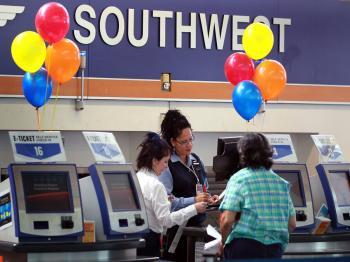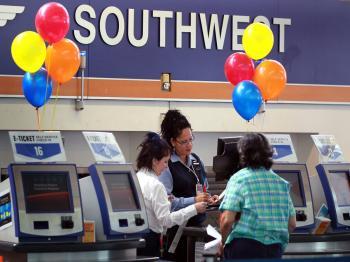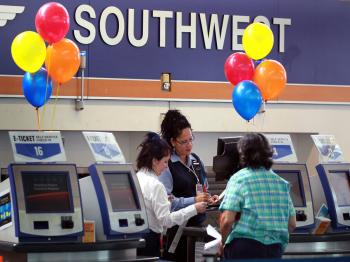WASHINGTON—Consumers surf the Internet day and night to find that special deal to save them a bundle on their upcoming flight, but looking at the airline industry, cheap fares may become a thing of the past.
Many airlines have consolidated, and a new round of price hikes may be on the horizon, according to experts. On some international routes, ticket prices are so close to each other that it is nearly impossible to choose a carrier if it weren’t for some perks that haven’t disappeared yet.
Experts are predicting new rounds of airline consolidations, beginning with the finalized UAL Inc. and Continental Airlines Inc. merger on Oct. 1, and Southwest Airlines Co.’s acquisition announcement of AirTran Holdings Inc. at the end of September, with a suggested value of around $3.4 billion.
“As soon as the [failed] United-US Airways merger was proposed, other major carriers began their own merger discussions. Don’t take those talks lightly. This industry knows that a major carrier’s market power depends on the size of the carrier’s network; it knows that no carrier can stand by while a competitor substantially increases the size of its network,” said chairman of the House Transportation Committee, Rep. James L. Oberstar, D-Minn., in a 2000 statement before the House Transportation & Infrastructure Committee.
The newly merged United Continental company is well on its way to becoming a power, exceeding the size of the recently formed Delta Air Lines, itself a result of a merger between Northwest Airlines and Delta.
“This is a true merger of equals. ... This sets us on a path to create the world’s leading airline from a position of strength, with one of the industry’s best cash positions, industry-leading revenues and a competitive cost structure,” said Glenn Tilton, non-executive chairman of the board for the newly merged company, in a recent statement.
Generally, airline consolidations create larger airlines that face greater liquidity problems. The larger carriers looking for a way out are announcing layoffs, retiring airplanes, cramming more people into one airplane, and applying other cost-cutting measures.
“Airlines also are trending away from regional jets with 50 or fewer seats because of their poor economics. With high fuel prices, the smaller jets cost almost as much to own and operate as larger ones with 70 seats or more,” according to a USA TODAY column.
“British Airways, American Airlines and Iberia signed a joint business agreement which will allow the three carriers to cooperate on flights across the Atlantic,” according to a recent British Airways Plc announcement.
The antitrust community has opened its eyes and is closely following route-sharing and alliance agreements. In the past, the Department of Justice (DOJ), with authority over antitrust issues concerning cooperative and alliance agreements between carriers, exempted airlines from a number of antitrust requirements. However, lately, the wind is blowing from a different direction.
“In the past, antitrust immunity has been fairly liberally granted to global airline partnerships. ... In a current case, the Department of Justice (DOJ) claims that the domestic businesses of the Continental-United alliance would be anti-competitive, and has asked that antitrust immunity be curtailed,” according to an article on the Westlaw Business website.
Many airlines have consolidated, and a new round of price hikes may be on the horizon, according to experts. On some international routes, ticket prices are so close to each other that it is nearly impossible to choose a carrier if it weren’t for some perks that haven’t disappeared yet.
Oligopoly in the Making?
“Industry consolidation has been underway since airline deregulation began to take effect in the 1970s. ... in the long run, the market could be served with three to five major carriers where there once were 20,” according to a recent Knowledge@Wharton (KW) report.Experts are predicting new rounds of airline consolidations, beginning with the finalized UAL Inc. and Continental Airlines Inc. merger on Oct. 1, and Southwest Airlines Co.’s acquisition announcement of AirTran Holdings Inc. at the end of September, with a suggested value of around $3.4 billion.
“As soon as the [failed] United-US Airways merger was proposed, other major carriers began their own merger discussions. Don’t take those talks lightly. This industry knows that a major carrier’s market power depends on the size of the carrier’s network; it knows that no carrier can stand by while a competitor substantially increases the size of its network,” said chairman of the House Transportation Committee, Rep. James L. Oberstar, D-Minn., in a 2000 statement before the House Transportation & Infrastructure Committee.
The newly merged United Continental company is well on its way to becoming a power, exceeding the size of the recently formed Delta Air Lines, itself a result of a merger between Northwest Airlines and Delta.
“This is a true merger of equals. ... This sets us on a path to create the world’s leading airline from a position of strength, with one of the industry’s best cash positions, industry-leading revenues and a competitive cost structure,” said Glenn Tilton, non-executive chairman of the board for the newly merged company, in a recent statement.
Generally, airline consolidations create larger airlines that face greater liquidity problems. The larger carriers looking for a way out are announcing layoffs, retiring airplanes, cramming more people into one airplane, and applying other cost-cutting measures.
“Airlines also are trending away from regional jets with 50 or fewer seats because of their poor economics. With high fuel prices, the smaller jets cost almost as much to own and operate as larger ones with 70 seats or more,” according to a USA TODAY column.
Scrutinizing Mergers
To remain financially viable, airlines, just as any other industry, have become creative. Airlines have begun to work with, instead of against their competitors. The airlines have begun to market each others’ routes to fill seats on an airplane, share customer lounges, and cooperate on a number of administrative and other functions.“British Airways, American Airlines and Iberia signed a joint business agreement which will allow the three carriers to cooperate on flights across the Atlantic,” according to a recent British Airways Plc announcement.
The antitrust community has opened its eyes and is closely following route-sharing and alliance agreements. In the past, the Department of Justice (DOJ), with authority over antitrust issues concerning cooperative and alliance agreements between carriers, exempted airlines from a number of antitrust requirements. However, lately, the wind is blowing from a different direction.
“In the past, antitrust immunity has been fairly liberally granted to global airline partnerships. ... In a current case, the Department of Justice (DOJ) claims that the domestic businesses of the Continental-United alliance would be anti-competitive, and has asked that antitrust immunity be curtailed,” according to an article on the Westlaw Business website.






